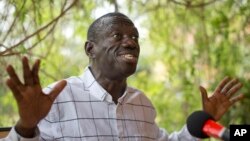The electoral commission of Uganda is prepared to meet the legal challenges opposition presidential and parliamentary candidates plan to launch this week following the outcome of the February 18 general election, says Jotham Taremwa, spokesman for the electoral commission.
Main opposition leader of the Forum for Democratic Change (FDC) Kizza Besigye and independent candidate Patrick Amama Mbabazi dispute the results of the poll. They have signaled they would be going to court, citing voter irregularities and rigging they said led to incumbent President Yoweri Museveni’s victory.
Uganda’s electoral law says challenges can be filed up to 10 days after results are announced.
The chairman of the electoral commission, Badru Kiggundu, declared Museveni winner of the presidential vote with 60.07 percent of the total vote cast, while Besigye came in second with 35.37 percent. Kiggundu insists the general election is credible, despite reports by some local and international poll observers who said the poll was held in intimidating circumstances and was neither free nor fair.
FDC chairman Mugisha Muntu told VOA initial evidence shows some of the poll results were manipulated. He says results on the declaration forms signed by all party representatives, which show the results at the polling stations, were different from those the electoral commission announced.Taremwa disagreed.
“Generally, everybody agrees the elections were a success.Everybody seems to be headed to the court in case they are not happy with the outcome. As a commission, we will continue to interact with our stakeholders to get an assessment of how we conducted our elections with a view of working out another strategic plan for the next five years as well as the roadmap.So, for us, it’s a work in progress,” said Taremwa.
“We did a wonderful job as a commission, we don’t know why they are not agreeing to the results, but well they can petition [the] court and we are ready to meet them in court.”
Taremwa said the international poll observers were wrong in their assessment of the presidential and parliamentary elections.
Opposition groups also accused the electoral commission of bias after voting in areas where they were strong - including the capital, Kampala - started about seven hours later than in other areas where the ruling National Resistance Movement (NRM) had a strong following. They said the assessment of the internal poll monitors echoed their concerns about the elections.
“Some of the international observers didn’t have some good time to do some research, conduct interviews with key stakeholders. They came in towards the end of the process and some of them were really not were versed in the political dynamics in the country. They came and just passed a judgment that really fell short of the correct reading of the political processes of Uganda ...We are really not bothered,” said Taremwa.
The European Union urged the electoral commission to publish all the election results from the 28,010 polling stations across the country. Opposition supporters say publishing the results could reveal how the elections were manipulated in favor of Museveni and his ruling National Resistance Movement party.
Taremwa rejected the accusations as without merit.
“You can get on your computer or laptop and open to our electoral commission website and access all the results from each of the polling stations.They are there, they are accessible and we have also given them soft copies of the results.So, we have already done what they are asking,” he said.




